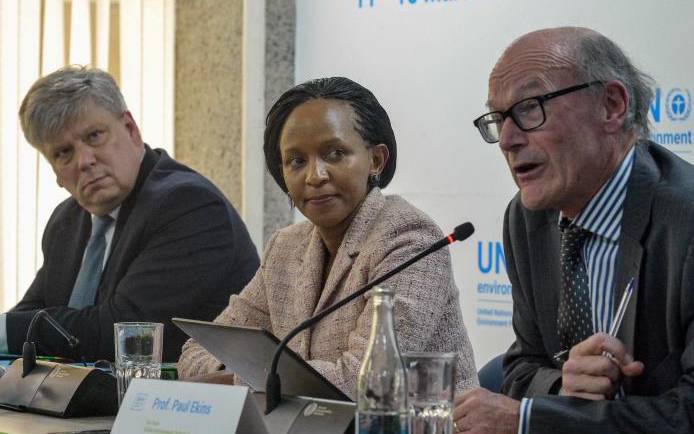
Estonia's Environment Minister and President of the UN Environment Assembly, Siim-Valmar Kiisler, Tanzanian microbiologist and Acting Executive Director of UN Environment Programme Joyce Msuya and British Professor Paul Ekins give a press conference after the opening plenary session of the 4th UN Environment Assembly at the UN headquarters in Nairobi, on March 13, 2019. [PHOTO:SIMON MAINA / AFP]
As the world strives to cut emissions, rising winter temperatures in the Arctic threaten to devastate the region and cause the sea level to rise worldwide, a new UN Environment report says.
The report, titled Global Linkages - A graphic look at the changing Arctic, also blames ocean acidification and plastic pollution for putting pressure on the Arctic environment.
“What happens in the Arctic does not stay in the Arctic. We have the science; now more urgent climate action is needed to steer away from tipping points that could be even worse for our planet than we first thought,” said Joyce Msuya, UN Environment’s acting executive director.
The study found that even if global emissions were to halt overnight, winter temperatures in the Arctic would still increase four to five degrees Celsius by 2100 compared to the late 20th century. It says this increase is locked into the climate system by greenhouse gases already emitted and ocean heat storage.
The study, which calls on Arctic societies to take immediate steps to tackle climate change, shows that Arctic indigenous peoples already face increased food insecurity. By 2050, four million people, and around 70 per cent of today’s Arctic infrastructure, will be threatened by thawing permafrost.
“The urgency to achieve the goals of the Paris Agreement is clearly manifested in the Arctic, because it is one of the most vulnerable and rapidly changing regions in the world,” said Finnish Minister of Environment, Energy and Housing, Kimmo Tiilikainen.
He said countries needed to make substantial near-term cuts in greenhouse gas emissions, black carbon and other so-called short-lived climate pollutants.
The report shows global impacts would also be huge. From 1979 to the present, Arctic sea ice is estimated to have declined by 40 per cent. It further shows that climate models predict that, at the current rate of carbon dioxide emissions, Arctic summers will be ice-free by the 2030s.
The melting of the Greenland ice cap and Arctic glaciers contribute to one-third of sea level rise worldwide.
Even if the Paris Agreement is met, the report says, Arctic permafrost is expected to shrink 45 per cent compared to today. These frozen soils hold an estimated 1.6 trillion metric tonnes of carbon hence would contribute significantly to carbon dioxide and methane emissions.
The resulting warming will in turn lead to more thawing – an effect known as ‘positive feedback’. This accelerated climate change could even throw the Paris Agreement’s two-degree Celsius goal off track, the report reveals.
Ocean acidification is also disproportionately impacting Arctic marine species because cold water can hold more dissolved carbon dioxide while melting ice spreads the acidity further.
The report shows the Arctic's ocean, seafloor and coastline have become a sink for contaminants from around the globe. However, on a positive note, the amount of regulated chemicals in humans and animals living in the Arctic has been decreasing. These include some persistent organic pollutants regulated under UN Environment’s Stockholm Convention.
However, the decrease could be due to changing diets.
 The Standard Group Plc is a multi-media organization with investments in media
platforms spanning newspaper print
operations, television, radio broadcasting, digital and online services. The
Standard Group is recognized as a
leading multi-media house in Kenya with a key influence in matters of national
and international interest.
The Standard Group Plc is a multi-media organization with investments in media
platforms spanning newspaper print
operations, television, radio broadcasting, digital and online services. The
Standard Group is recognized as a
leading multi-media house in Kenya with a key influence in matters of national
and international interest.











